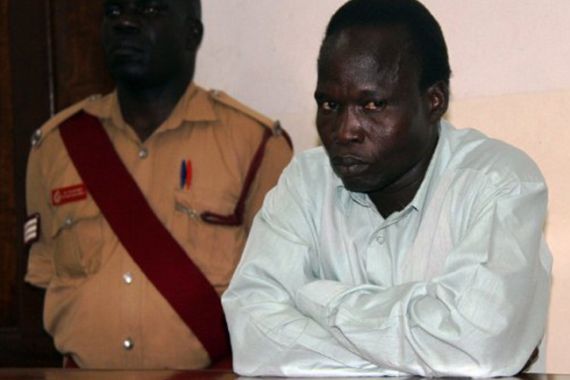Uganda opens first war crimes trial
Lord’s Resistance Army officer denies 53 counts of willful killing and hostage-taking during 20-year campaign.

The first Ugandan war crimes trial opened on Monday with the official charging of a commander in the Lord’s Resistance Army blamed for brutal civilian murders during a 20-year war in the north of the country.
Thomas Kwoyelo was charged with 53 counts of willful killing, hostage-taking, destruction of property and causing injury. The hearing took place before the International Crimes Division court in the northern town of Gulu
The 39-year-old Kwoyelo denied the charges arising from his role as a “colonel” under the command of LRA leader Joseph Kony, himself wanted by the International Criminal Court for committing atrocities against civilians.
Kwoyelo was arrested in March 2009 in Garamba forest in the Democratic Republic of Congo during a sweep by regional forces against the LRA rebels who had fled from northern Uganda two years earlier.
“All attacks were either committed by him or were carried out with his full knowledge,” the charging document against Kwoyelo read.
Torture and summary execution
Kwoyelo joined the rebel group in 1987 and is accused of leading several village raids, killing and abducting civilians in northern Uganda between 1992 and 2005.
In one of the attacks in 1996, the rebels abducted a group of villagers at a ceremony and forced them to carry their loot.
“Those who failed were summarily executed,” according to the charge sheet. “The rebels brutally tortured the women. The accused then ordered his forces to kill all the elderly captives … The rebels embarked on a fatal assault of the captives using guns, clubs and axes.”
Yorokamu Bamwiine, Uganda’s principal judge, said that “justice must be done and it is there to be done … This is regardless of who wins or who loses.”
Defence lawyer Caleb Alaka argued that Kwoyelo should not be prosecuted because he had asked for amnesty, which some top LRA commanders have received.
“Higher officers in the LRA … were granted amnesty. Since the brigadiers were granted amnesty, the denial by the directorate of public prosecutions … infringes on his constitutional rights to fair treatment,” Alaka said.
Kwoyelo was remanded into government custody until July 25, when defence and prosecution lawyers will make their opening statements.
‘Never thought’ Kwoyelo would be charged
The trial drew huge attention, and the courtroom was packed with people wanting to witness the first time a rebel from Uganda’s most violent insurgent group would face justice.
“I never thought any of the rebel leaders could be brought to face charges,” said Annet Anywar, a resident of Gulu. “But instead of apologising, he denies, which annoys me.”
Kwoyelo is not among the top LRA commanders, including Kony, wanted by the International Criminal Court for rape, mutilation, murdering and forcefully recruiting child soldiers.
“Domestic war crimes prosecutions are essential to ensuring perpetrators of serious crimes committed during the conflict in northern Uganda do not escape justice,” said Elise Keppler, Human Rights Watch justice counsel.
“But trials must be fair and credible and witnesses need adequate protection. This first trial before the International Crimes Division will test whether these standards are being met,” she said in a statement.
Kony still at large
The insurgency and the fighting between the rebels and Ugandan forces claimed the lives of tens of thousands of people and saw nearly two million displaced.
The civil war effectively ended in 2006 when a peace process was launched, but Kony and his top commanders have remained elusive and continued to commit atrocities in remote areas of neighbouring countries.
Troops from Congo, Uganda and Sudan began a joint offensive in late 2008 against the LRA after Kony repeatedly failed to show up to sign a peace deal with Kampala, but they have failed to capture him.
The LRA supremo, a semi-literate former altar boy, took charge in 1988 of a regional rebellion among northern Uganda’s ethnic Acholi minority.